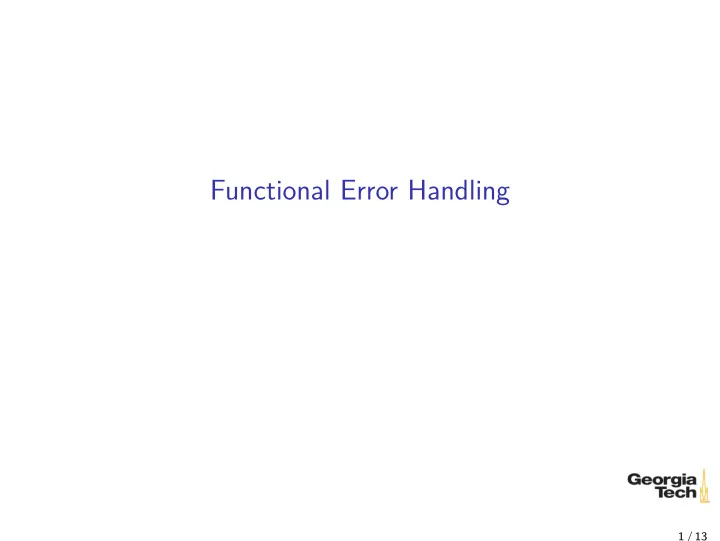

Functional Error Handling 1 / 13
What’s right with exceptions? Exceptions provide ◮ a way to consolidate error handling code and separate it from main logic, and ◮ an alternative to APIs that require callers of functions to know error codes, sentinal values, or calling protocols. We can preserve both of these advantages while avoiding the disadvantages of exceptions. 2 / 13
What’s wrong with exceptions? Exceptions ◮ break referential transparency, ◮ are not type-safe, and ◮ functions that throw excpetions are partial . Also, exception syntax is a pain. 3 / 13
Exceptions break referential transparency. 1 def failingFn(i: Int): Int = { 2 val y: Int = throw new Exception("fail!") 3 try { 4 val x = 42 + 5 5 x + y 6 } catch { 7 case e: Exception => 43 8 } 9 } If y were referentially transparent, then we should be able to substitute the value it references: 1 def failingFn2(i: Int): Int = { 2 try { 3 val x = 42 + 5 4 x + ((throw new Exception("fail!")): Int) 5 } catch { 6 case e: Exception => 43 7 } 8 } But failingFn2 returns a different result for the same input. 4 / 13
Type-safety and Partiality 1 def mean(xs: Seq[Double]): Double = 2 if (xs.isEmpty) 3 throw new ArithmeticException("mean of empty list undefined") 4 else 5 xs.sum / xs.length mean(Seq(1,2,3)) returns a value, but mean(Seq()) throws an exception ◮ The type of the function, Seq[Double] => Double , does not convey the fact that an exception is thrown in some cases. ◮ mean is not defined for all values of Seq[Double] . In practice, partiality is common, so we need a way to deal with it. 5 / 13
Functional Error Handling in the Scala Standard Library The Scala standard library defines three useful algebraic data types for dealing with errors: ◮ Option , which represents a value that may be absent, ◮ Either , which represents two mutually-exclusive alternatives, and ◮ Try , which represents success and failure Note: Chapter 4 of Functional Programming in Scala defines its own parallel versions of Option and Either , but we’ll use the standard library versions. For a deeper understanding do the exercises in the book. 6 / 13
The Option Type We’ve seen Option before: 1 sealed abstract class Option[+A] 2 final case class Some[+A](value: A) extends Option[A] 3 case object None extends Option[Nothing] Using Option , mean becomes 1 def mean(xs: Seq[Double]): Option[Double] = 2 if (xs.isEmpty) None 3 else Some(xs.sum / xs.length) 7 / 13
Option ’s Definition Option defines many methods that mirror methods on Traversable s. 1 sealed abstract class Option[+A] { 2 def isEmpty: Boolean 3 def get: A 4 5 final def getOrElse[B >: A](default: => B): B = 6 if (isEmpty) default else this.get 7 8 final def map[B](f: A => B): Option[B] = 9 if (isEmpty) None else Some(f(this.get)) 10 11 final def flatMap[B](f: A => Option[B]): Option[B] = 12 if (isEmpty) None else f(this.get) 13 14 final def filter(p: A => Boolean): Option[A] = 15 if (isEmpty || p(this.get)) this else None 16 } The key consequence is that you can treat Option as a collection, leading to Scala’s idioms for handling optional values. 8 / 13
Option Examples 1 case class Employee(name: String, department: String) 2 3 def lookupByName(name: String): Option[Employee] = // ... 4 5 val joeDepartment: Option[String] = lookupByName("Joe").map(_.department) 9 / 13
Option Idioms 1 case class Employee(name: String, department: String) 2 3 def lookupByName(name: String): Option[Employee] = // ... 4 5 val joeDepartment: Option[String] = lookupByName("Joe").map(_.department) 1 val dept: String = 2 lookupByName("Joe"). 3 map(_.dept). 4 filter(_ != "Accounting"). 5 getOrElse("Default Dept") The getOrElse at the end returns "Default Dept" if Joe doesn’t have a department, or if Joe’s department is not "Accounting" . 10 / 13
Dealing with Exception-Oriented APIs 1 scala> import scala.util.Try 2 import scala.util.Try 3 4 scala> Try { "foo".toInt } 5 res1: scala.util.Try[Int] = Failure(java.lang.NumberFormatException: For input string: "foo") 6 7 scala> Try { "1".toInt } 8 res2: scala.util.Try[Int] = Success(1) 11 / 13
Either s Return error message on failure: 1 def mean(xs: IndexedSeq[Double]): Either[String, Double] = 2 if (xs.isEmpty) 3 Left("mean of empty list!") 4 else 5 Right(xs.sum / xs.length) Return the exception itself on failure: 1 def safeDiv(x: Int, y: Int): Either[Exception, Int] = 2 try Right(x / y) 3 catch { case e: Exception => Left(e) } 12 / 13
Closing Thoughts Rule of thumb: only throw exceptions exceptions in cases where the program could not recover from the exception by catching it. 13 / 13
Recommend
More recommend